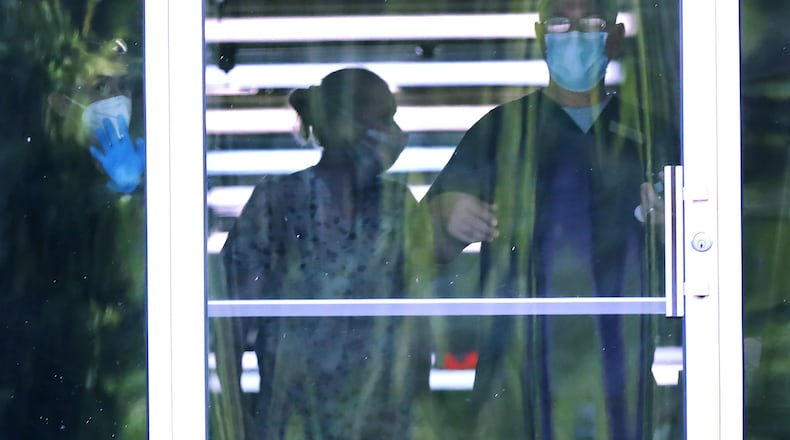President Joe Biden’s vow in his State of the Union speech Tuesday to increase oversight of nursing homes drew praise from patient advocates, but instant pushback from the nursing home industry in Georgia, who said it would damage them without helping them meet the goals.
In initiatives detailed this week, the Biden administration said it will set a staff ratio requirement for nursing homes, in hopes of ensuring they always have enough staff to handle the patient load. It will also increase fines and penalties for facilities with poor records of caring for patients, and look for ways to phase out patient rooms with roommates in an effort to decrease infection spread and provide privacy.
Biden also plans to ask Congress for funding to increase inspections.
More than 27,000 Georgians, some of the state’s most vulnerable patients, live in nursing homes. AARP CEO Jo Ann Jenkins said she was “encouraged” by the plans, calling them “actions to ensure that residents in nursing homes will receive the safe, high-quality care they deserve.”
Georgia nursing home representatives, however, called it an unfunded mandate that turned a deaf ear to the sacrifices they’ve made providing health care in the pandemic.
“Our mission aligns with the goals of the Biden Administration,” said Tony Marshall, president of the Georgia Health Care Association, a nursing home industry advocacy group. “However, we have serious concerns regarding the Administration’s plans to implement further staffing requirements without prioritizing resources and funding to ensure nursing homes are able to meet those requirements.”
Research has shown a history of problems at nursing homes, where patients are not always physically or mentally able to advocate for themselves if care falls short.
The situation was a ripe setup for the COVID-19 pandemic to wreak even more havoc among the elderly residents. Well over 3,000 residents of nursing homes in Georgia died of COVID-19.
Biden acknowledged the alarm, saying in his address, “As Wall Street firms take over more nursing homes, quality in those homes has gone down and costs have gone up. That ends on my watch.”
It was unclear, however, how much power Biden has to make it end. Much of the tension concerns a widely acknowledged shortage of qualified health care workers.
The shortage of workers already existed prior to the pandemic, and has only worsened as exhaustion and stress led many to leave the profession. Those who stayed, especially registered nurses, often found they could make much more money by leaving their regular jobs and going back to work through temp agencies. Hospitals and nursing homes say that the agencies have in many cases not increased the supply of workers, but just recycled them at higher costs.
Nursing homes representatives suggested that giving them enough money to pay workers more would enable them to increase staffing. But nursing homes aren’t always cash cows.
Biden emphasized the role of private equity in nursing home quality.
His proposal doesn’t appear to address private-pay senior care such as assisted living facilities and large personal care homes. An Atlanta Journal-Constitution investigation in 2019 uncovered widespread problems in those homes including insufficient oversight and profit-minded management that led to devastating harm to patients and residents. While many facilities work to provide decent care, the AJC learned from whistleblowers and court records of many instances where short staffing led to neglect, inadequate care, harm to patients, and even death.
But some of the investigation’s findings are relevant to the federally regulated nursing homes.
The AJC found that investors had rushed into senior care expecting to make money as residents flowed in. But the windfall often did not materialize, and owners who found themselves in financial difficulty then faced the question of paying for adequate staffing.
Even before the pandemic, the AJC’s investigation found that more than 20% of Georgia’s assisted living communities and large personal care homes had owners or operators that faced recent financial problems.
Having enough paying patients is key. During the pandemic, the census in Georgia nursing homes has fallen more than 10%, leaving more than a quarter of nursing home beds unoccupied, according to GHCA.
Ginny Helms is president of Leading Age Georgia, which represents nonprofit nursing home facilities
“The real issue in my mind is that there’s a staffing crisis,” she said. “And that if they truly want to improve the quality of care, focusing on fortifying the staffing, what we really need to do is re-look at the Medicaid rates.”
Although Medicaid is mostly known as the government insurance plan for children and lower-income moms in Georgia, it also pays for nursing home residents. That’s expensive, and even though nursing home residents are a small number of Georgia Medicaid’s patients, it’s a huge amount of the funding outlay.
Increasing payments for nursing homes would require money from federal and state coffers. It’s an open question whether lawmakers in Georgia or Congress are willing to do that.
But Biden didn’t mention that in his address. His administration has, however, said it would request more money for more inspectors to increase inspections.
Jenkins, of AARP, cheered that notion, saying AARP “urges the federal government to act swiftly to ensure minimum staffing standards, increase transparency, and hold nursing homes accountable when they do not provide quality care.” She added that “It is a national disgrace that more than 200,000 residents and staff in nursing homes and other long-term care facilities died” in the pandemic.
About the Author
The Latest
Featured



